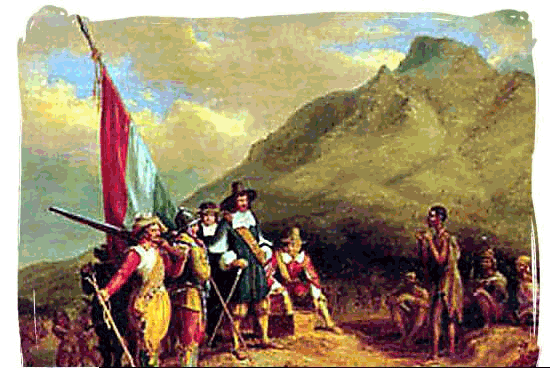
Types of Colonies
| Colonies of Settlement |
Colonies of settlement resulted when citizens of a foreign country, the colonizing country, migrated to and eventually took complete control of a new area. These areas came to be dominated not only by foreign people but also by foreign crops and animals. The foreign colonizers ordinarily substituted their culture for the existing one. Settlers often excluded native inhabitants from their society or killed many of them in violent confrontations or by exposure to disease. In the Americas, many Native Americans died from diseases introduced by Europeans, diseases to which they had no immunity. Colonies of settlement were located in temperate zones, with climates similar to Europeís. They are sometimes called neo-Europes or, until recently, White Manís Countries. Examples of settlement colonies include English colonies in parts of the United States, Canada, and Australia.

| Colonies of Exploitation |
Colonies of exploitation, also known as tropical dependencies, did not attract large numbers of permanent European settlers. Europeans went to these colonies primarily as planters, administrators, merchants, or military officers. In exploitation colonies, foreign powers established political control, if necessary using force against colonial resistance, but they did not displace or kill native societies. They also did not, for the most part, intentionally destroy indigenous (native) cultures. Thus, the geographical circumstances and historical dynamics of exploitation colonies are profoundly different from those of colonies of settlement.
A colony of exploitation had an economy based on products of the labor of local inhabitants, working either on their own land or on plantations. These colonies usually produced cash crops such as spices, cotton, palm oil, or rubber. Colonies of exploitation included Indonesia and Malaya in Southeast Asia, and Nigeria and Ghana in West Africa.
| Contested Settlement Colonies |
In a contested settlement colony, a significant number of European settlers took up permanent residence. They tended to develop their own government, independent of, or even in defiance of, the parent country. A contested settlement colony also formed its own cultural and political identity. Politically, white citizens dominated native peoples.
However, the native population not only survived, but increased. Native peoples managed to maintain some control over their lives, although their political control was usually slight. Furthermore, their labor remained the backbone of the economy. Eventually, native people were able to successfully contest white control of the colony, both the control by the colonizing country and control by the settlers. Examples of contested settlement colonies include Algeria and Southern Rhodesia, both in Africa.
| Other Types of Colonies |
 There are several other
types of colonialism and imperialism, including preexisting empires, internal
colonialism, and spheres of influence or informal empires. Preexisting
empires were or had been powerful states that possessed a large population,
strong political structures, and a sophisticated economy. India under English
rule is an example.
There are several other
types of colonialism and imperialism, including preexisting empires, internal
colonialism, and spheres of influence or informal empires. Preexisting
empires were or had been powerful states that possessed a large population,
strong political structures, and a sophisticated economy. India under English
rule is an example.
In internal colonialism, one geographic area or ethnic group dominated another within the same country. Examples of this kind of internal control include the economic domination of the American South by the North after the American Civil War (1861-1865), or the influence of England over other areas of the British Isles.
In spheres of influence or informal empires, Europeans interfered in the internal affairs of a state but stopped short of formal political annexation. During the 19th century, individual Western nations declared so-called spheres of influence over parts of China. They even required that disputes involving Europeans in these areas of China had to be judged according to Western law in Western courts. During the 19th and early 20th centuries, in areas ruled under the Ottoman Empire, some Western nations invested heavily in canals and railroads and intervened politically when they felt they needed to protect those investments. The concept of an informal empire is used to describe British or American relations with the former Spanish colonies in South and Central America after Latin American independence in the early 19th century.